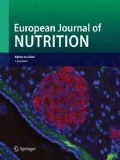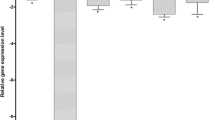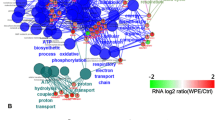Summary
Background
Many different mechanisms are involved in nutrient–related prevention of colon cancer. In this study, a comprehensive assessment of the spectrum of possible biological actions of the bioactive compound quercetin is made using multiple gene expression analysis. Quercetin is a flavonoid that can inhibit proliferation of tumor cells and reduce the number of aberrant crypt foci, although increase of number of colon tumors was also reported.
Aim of the study
In order to elucidate possible mechanisms involved in its mode of action the effect of quercetin on expression of 4000 human genes in Caco–2 cells was studied and related to functional effects.
Methods
Caco–2 cells were exposed to 5 or 50 µM quercetin for 48 hours, differential expression of 4000 human genes was studied using microarrays and related to functional effects. Differentially expressed genes were categorized in seven functional groups: cell cycle and differentiation, apoptosis, tumor suppressor genes and oncogenes, cell adhesion and cell–cell interaction, transcription, signal transduction and energy metabolism. Also, cell proliferation and cell cycle distribution were measured.
Results
Quercetin (5µM) downregulated expression of cell cycle genes (for example CDC6, CDK4 and cyclin D1), downregulated cell proliferation and induced cell cycle arrest in Caco–2 cells. After exposure to 50 µM quercetin cell proliferation decreased to 51.3% of control, and further decrease of the percentage of cells in the G1 phase coincided with an increase of the percentage of cells in the sub–G1 phase. Quercetin upregulated expression of several tumor suppressor genes. In addition, genes involved in signal transduction pathways like beta catenin/TCF signalling and MAPK signal transduction were influenced by quercetin.
Conclusions
This study shows that large–scale gene expression analysis in combination with functional assays yields a considerable amount of information on (anti–)carcinogenic potential of food components like quercetin.
Similar content being viewed by others
Author information
Authors and Affiliations
Corresponding author
Rights and permissions
About this article
Cite this article
van Erk, M.J., Roepman, P., van der Lende, T.R. et al. Integrated assessment by multiple gene expression analysis of quercetin bioactivity on anticancer–related mechanisms in colon cancer cells in vitro. Eur J Nutr 44, 143–156 (2005). https://doi.org/10.1007/s00394-004-0503-1
Received:
Accepted:
Published:
Issue Date:
DOI: https://doi.org/10.1007/s00394-004-0503-1




